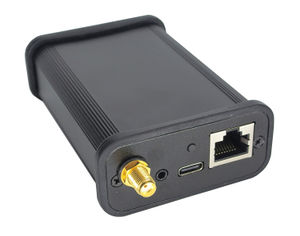Difference between revisions of "E1/T1 Interface"
(→icE1usb) |
(→Driver configuration) |
||
| Line 37: | Line 37: | ||
<pre> | <pre> | ||
| + | log stderr | ||
| + | logging filter all 1 | ||
| + | logging color 1 | ||
| + | logging print category-hex 0 | ||
| + | logging print category 1 | ||
| + | logging print thread-id 0 | ||
| + | logging timestamp 1 | ||
| + | logging print file 1 | ||
| + | logging level e1d info | ||
e1d | e1d | ||
interface 0 icE1usb | interface 0 icE1usb | ||
Revision as of 09:57, 6 October 2022
Contents
[hide]Why not TDMoIP / CESoIP?
Usual E1/T1 over IP protocols use generic frames over IP transfer that makes 2 megabits constant rate with up to 8000 packets per second. That approach:
- not suitable for distributed sites with limited internet access
- makes constant parasite load on the servers
- requires delays to compensate jitters
- has issues with asynchronous-to-synchronous transition
Fur such kind of integrations we prefer to have our own agent software on-site with hardware E1/T1 interfaces.
- good timings driven by E1/T1 clock or GPS
- good framing due to synchronous composition on the site
- less traffic due to transfer only valuable demultiplexed information
icE1usb
We have chosen Osmocom icE1usb as a primary interface for our projects for several reasons:
- good compatibility with big range of hardware hosts due to use USB
- in opposite to most of DAHDI interfaces it is in production
- open-source hardware design
- open-source user-space driver, no need for the kernel driver
- suitable API for our purposes
- available at Sysmocom's web shop
Driver installation
We maintained [Osmocom E1D] in our Debian repositories. It has no modifications so you can shose any source of packages you want or build from the sources.
- sudo apt install osmo-e1d
Driver configuration
/etc/osmocom/osmo-e1d.cfg
- log stderr
- logging filter all 1
- logging color 1
- logging print category-hex 0
- logging print category 1
- logging print thread-id 0
- logging timestamp 1
- logging print file 1
- logging level e1d info
- e1d
- interface 0 icE1usb
- usb-serial [interface serial number]
- line 0
 BrandMeister
BrandMeister